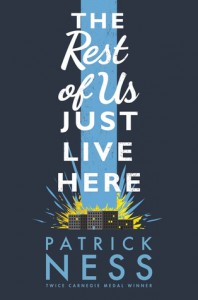Word Revel
Book blogger, recent Sociology grad in her twenties. Stares at labels when no books are in sight. Disproportionately reads YA. This is a companion blog to http://wordrevel.com.
The Rest of Us Just Live Here
 Initial thoughts: I won't lie — I felt very disconcerted reading the first couple of chapters. I wanted to know what this strange world is that is so much like our own and yet isn't. Take away all the uncertain elements and the year could very well be just a couple of years ahead of 2015 (on account of Twitter being passé and old TVs and VCRs still existing in some remote abandoned corners). Now include all the uncertain paranormal elements and what have you got? In a way, still our world. People believe so many different things and at the end of the day, there's no way of knowing how the unknown comes to influence our lives.
Initial thoughts: I won't lie — I felt very disconcerted reading the first couple of chapters. I wanted to know what this strange world is that is so much like our own and yet isn't. Take away all the uncertain elements and the year could very well be just a couple of years ahead of 2015 (on account of Twitter being passé and old TVs and VCRs still existing in some remote abandoned corners). Now include all the uncertain paranormal elements and what have you got? In a way, still our world. People believe so many different things and at the end of the day, there's no way of knowing how the unknown comes to influence our lives.The difficult questions that many a person will ask because we need to order and classify everything we know are, is this contemporary fiction? Or is it fantasy? This books somewhat defies conventional YA genres despite it clearly being targeted at the YA audience. It isn't strictly contemporary but it isn't strictly fantasy or paranormal either. Genre is a very fluid term when applied here.
And then, who are these gods that reign above yet are only concerned about their own realms. Do they even matter? Not to Mike and Mike is the narrator of the story. He cares about his immediate reality more so than the strange occurrences that happen around him. That's kind of like most of us too, no? We're the centre of our lives and things happen along the periphery; people are hailed as heroes, people advance scientific research, people campaign for politics. Yet these things rarely matter to us more than we do.
When I consider The Rest of Us Just Live Here through a postmodern lens, then I see genius in this work of Patrick Ness. It encompasses paranoia to the highest degree, it revels in chaos and fragmentation, it is metaficitve — completely aware of its status as the fourth wall is broken, and it borders on hyperrealism. To regard it all through my bygone ninth grade literature education, a lot of things clicked into place.
Beyond the literary devices though, there also is diversity in a way that matters and yet doesn't at all and a highly respectful treatment of anxiety. After my disappointment in Finding Audrey by Sophie Kinsella, I'm surprised I found redemption in The Rest of Us Just Live Here and the approach that Patrick Ness took in including very real mental struggles that his characters face in this book.
Currently reading

A Corner of White

Post-TV: Piracy, Cord-Cutting and the Future of Television

A Court of Thorns and Roses

Girls, Texts, Cultures